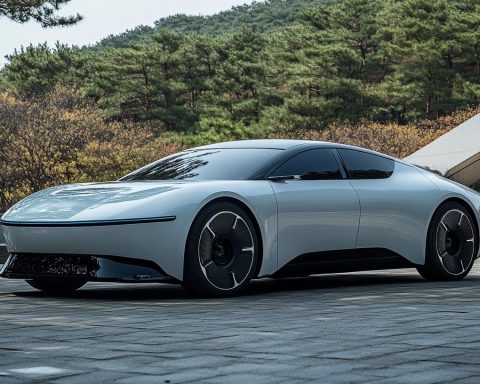BMW’s Bold Step into Hydrogen Technology
In an ambitious move, BMW announced last year that it would launch its first hydrogen-powered fuel-cell electric vehicle (FCEV), the iX5 Hydrogen, by 2028. The excitement stems from the environmental promise of hydrogen cars, which can be refueled in just a few minutes, much like traditional petrol vehicles.
However, many experts argue that the shift to hydrogen may not gain traction. Analysts point out that battery electric vehicles (BEVs) have established themselves as the preferred solution for reducing carbon emissions in transportation. The current hydrogen market is struggling, with a lack of sales and a reliance on fossil fuel-based hydrogen production that undermines the supposed environmental benefits.
Hydrogen cars operate by converting hydrogen stored in tanks into electricity via fuel cells, which has its advantages. Unlike BEVs, hydrogen technology provides consistent performance even in frigid conditions. Additionally, refueling takes less than five minutes, offering a significant benefit for long-distance travel compared to the lengthy charging times associated with electric vehicles.
Despite the potential, hydrogen vehicles struggle with infrastructure and market adoption, leading to doubts about their future viability. Currently, the UK has two hydrogen car models, but they are rarely seen on the roads. With manufacturers like Toyota and BMW still invested in hydrogen, the debate continues: will hydrogen be the key to a sustainable future, or is it an idea whose time has passed?
Hydrogen’s Broader Implications for Society and the Environment
The advent of hydrogen technology in the automotive sector, as exemplified by BMW’s potential rollout of the iX5 Hydrogen by 2028, signifies more than just a new vehicle; it potentially reshapes societal views on energy and mobility. As the quest for sustainable transportation intensifies, there is a crucial need for innovation that transcends conventional battery electric vehicles (BEVs). Hydrogen power could catalyze a shift in public perception regarding clean energy solutions, emphasizing a diversified portfolio of technologies in the fight against climate change.
However, the global economy faces significant challenges in mainstreaming hydrogen as a viable alternative. The current reliance on fossil fuel-derived hydrogen compromises its environmental integrity. This could hinder investment and growth in renewable hydrogen production methods, such as electrolysis powered by solar and wind energy. If scaled appropriately, a robust hydrogen economy may bolster job creation across multiple sectors—from manufacturing to distribution—albeit requiring substantial upfront investment in infrastructure.
Furthermore, the long-term significance of hydrogen technology includes its potential to transform urban environments. As cities wrestle with pollution and optimize for sustainability, hydrogen stations could become part of the urban landscape, akin to today’s gas stations. Nevertheless, a pervasive infrastructure network is vital for the acceptance of hydrogen vehicles, challenging governments and private sectors to collaborate on this expansive ambition. Ultimately, the success of hydrogen technology relies not only on automakers’ innovations but also on societal adaptation and collaborative political will, making it a focal point for future dialogues about energy and the environment.
The Future of Mobility: Exploring BMW’s Hydrogen Revolution
BMW’s Innovations in Hydrogen Technology
In a groundbreaking announcement last year, BMW revealed plans to introduce its first hydrogen-powered fuel-cell electric vehicle (FCEV), the iX5 Hydrogen, slated for launch by 2028. This ambitious endeavor highlights the growing interest in hydrogen as a viable alternative to traditional energy sources in the automotive industry.
Why Hydrogen? Benefits and Features
Hydrogen vehicles operate by converting hydrogen gas into electricity through fuel cells, offering several advantages over conventional battery electric vehicles (BEVs):
– Fast Refueling: A major appeal of hydrogen vehicles is their ability to refuel in under five minutes—similar to gasoline or diesel cars. This rapid refueling capability makes hydrogen a compelling option for long-distance travel.
– Performance in Extreme Conditions: Hydrogen technology performs consistently even in cold weather, where BEV performance can falter due to battery limitations.
– Reduced Weight: Fuel cells can be lighter than large battery packs, potentially improving vehicle dynamics and efficiency.
Market Challenges and Limitations
Despite the advantages, hydrogen vehicles face significant obstacles in market adoption:
– Infrastructure Shortcomings: The lack of hydrogen refueling stations hinders the widespread use of hydrogen vehicles. As of now, countries like the UK have only a couple of hydrogen models on the road, primarily due to deficient infrastructure.
– Production Concerns: Most hydrogen is still produced from fossil fuels, raising questions about the environmental benefits of hydrogen technology. Transitioning to green hydrogen—produced via renewable energy—is essential for sustainable growth.
– Competition with BEVs: Analysts highlight that BEVs have established a more substantial market presence, aided by improvements in battery technology and a rapidly expanding charging infrastructure.
Market Trends and Future Predictions
The hydrogen vehicle market is at a pivotal point. As automakers like BMW and Toyota continue to invest in hydrogen technology, industry experts speculate on the following trends:
– Investment in Infrastructure: More investments in hydrogen refueling stations could enhance the viability of hydrogen vehicles. Collaborative efforts between governments and private companies will be crucial to expanding infrastructure.
– Shift Toward Green Hydrogen: As environmental concerns grow, the shift from fossil fuel-based hydrogen production to green methods may redefine the market, making hydrogen vehicles more sustainable.
– Diverse Use Cases: Beyond passenger cars, hydrogen fuel cells are being explored for heavy-duty transportation, buses, and even shipping, showcasing hydrogen’s versatility.
Pros and Cons of Hydrogen Technology
Pros:
– Quick refueling times.
– Better performance in cold conditions.
– Potentially lighter vehicle weight.
Cons:
– Limited refueling infrastructure.
– High production costs and reliance on fossil fuels.
– Battery electric vehicles have more established market dominance.
Conclusion: A Dual Future?
As BMW puts its hydrogen ambitions into motion, the automotive sector finds itself at a crossroads. The future may not be binary—both hydrogen and battery technologies could coexist, offering diversified solutions for sustainable mobility. Whether hydrogen will emerge as a primary player in the automotive market remains to be seen, but its potential cannot be dismissed as we move toward a more sustainable future.
For more insights on advancements in hydrogen technology and electric vehicles, visit BMW.














